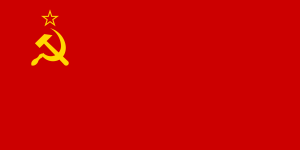No edit summary |
No edit summary |
||
| Line 1: | Line 1: | ||
[[File:Flag of the Soviet Union.svg.png|thumb|Flag of the Soviet Union from 1955-1991]] | [[File:Flag of the Soviet Union.svg.png|thumb|Flag of the Soviet Union from 1955-1991]] | ||
The '''Soviet Union''', officially the '''Union of Soviet Socialist Republics''' ('''USSR'''), was a [[State socialism|socialist state]] in [[Eurasia]] from 1922-1991 that synthesized [[Marxism-Leninism]], defeated [[fascism]], and ultimately fell to [[revisionism]] in 1956. Established by the [[Communist Party of the Soviet Union]] (CPSU) in the aftermath of the [[Russian Civil War]], the USSR was led by [[Vladimir Lenin]] until his death in 1924 | The '''Soviet Union''', officially the '''Union of Soviet Socialist Republics''' ('''USSR'''), was a [[State socialism|socialist state]] in [[Eurasia]] from 1922-1991 that synthesized [[Marxism-Leninism]], defeated [[fascism]], and ultimately fell to [[revisionism]] in 1956. Established by the [[Communist Party of the Soviet Union]] (CPSU) in the aftermath of the [[Russian Civil War]], the USSR was led by [[Vladimir Lenin]] until his death in 1924. This period set a precedent for [[Leninism]] as a tradition and model for how [[Socialism|socialist]] states should function. [[Joseph Stalin]] came to power after Lenin and began a process of mass industrialization, which was pivotal for the USSR's victory in the [[Great Patriotic War]] against fascism in 1941-1945. It was under Stalin that Marxism-Leninism completed its synthesization with Russian civilization and tradition. During Stalin's era, [[religion]] was reconciled with [[Communism]], and the precedent of [[socialist patriotism]] was reaffirmed. Stalin's death in 1953 led to a usurpaton of the country by [[Nikita Khrushchev]], who altered the class character of the [[CPSU]] and the Soviet state by replacing the [[dictatorship of the proletariat]] for a social-democratic [['All-People's State']] in 1956. These revisions turned the country towards [[social imperialism]]. The Khrushchev era ultimately contributed to the [[Dissolution of the Soviet Union|death of the country]] in 1991 due to the a wave of [[historical nihilism]], foreign ideological infiltration, covert [[Color revolution|color revolutions]] and final capitulation to the West by [[Mikhail Gorbachev]]. | ||
The USSR continues to have a strong legacy among the [[post-Soviet states]]. To this day, the USSR is remembered as the greatest time in history according to 75% of [[Russia|Russians]], 54% of [[Belarus|Belarusians]], and an uncalculated majority of [[Kazakhstan|Kazakhs]].<ref>[https://www.themoscowtimes.com/2020/03/24/75-of-russians-say-soviet-era-was-greatest-time-in-countrys-history-poll-a69735 75% of Russians Say Soviet Era Was 'Greatest Time' in Country’s History – Poll]</ref><ref>[https://www.pewresearch.org/fact-tank/2017/06/29/in-russia-nostalgia-for-soviet-union-and-positive-feelings-about-stalin/ In Russia, nostalgia for Soviet Union and positive feelings about Stalin]</ref><ref>[https://carnegieendowment.org/2011/11/30/kazakhstan-s-soviet-legacy-pub-46096 Kazakhstan's Soviet Legacy]</ref> Vladimir Lenin has a 56% approval rating in Russia today.<ref>[https://www.newsweek.com/lenin-support-peaks-russian-revolution-bolshevik-centennial-586201 Russian Support for Vladimir Lenin Peaks Ahead of Bolshevik Revolution Centennial]</ref> Even higher, Joseph Stalin has a 70% approval rating in modern Russia.<ref>[https://www.themoscowtimes.com/2019/04/16/stalins-approval-rating-among-russians-hits-record-high-poll-a65245 Stalin’s Approval Rating Among Russians Hits Record High – Poll]</ref> Stalin's approval in [[Georgia (Caucasus)|Georgia]] and [[Armenia]] also remains relatively high, at 45% and 38% respectively.<ref>[https://www.themoscowtimes.com/2013/03/02/poll-finds-stalins-popularity-high-a21998 Poll Finds Stalin's Popularity High]</ref> | The USSR continues to have a strong legacy among the [[post-Soviet states]]. To this day, the USSR is remembered as the greatest time in history according to 75% of [[Russia|Russians]], 54% of [[Belarus|Belarusians]], and an uncalculated majority of [[Kazakhstan|Kazakhs]].<ref>[https://www.themoscowtimes.com/2020/03/24/75-of-russians-say-soviet-era-was-greatest-time-in-countrys-history-poll-a69735 75% of Russians Say Soviet Era Was 'Greatest Time' in Country’s History – Poll]</ref><ref>[https://www.pewresearch.org/fact-tank/2017/06/29/in-russia-nostalgia-for-soviet-union-and-positive-feelings-about-stalin/ In Russia, nostalgia for Soviet Union and positive feelings about Stalin]</ref><ref>[https://carnegieendowment.org/2011/11/30/kazakhstan-s-soviet-legacy-pub-46096 Kazakhstan's Soviet Legacy]</ref> Vladimir Lenin has a 56% approval rating in Russia today.<ref>[https://www.newsweek.com/lenin-support-peaks-russian-revolution-bolshevik-centennial-586201 Russian Support for Vladimir Lenin Peaks Ahead of Bolshevik Revolution Centennial]</ref> Even higher, Joseph Stalin has a 70% approval rating in modern Russia.<ref>[https://www.themoscowtimes.com/2019/04/16/stalins-approval-rating-among-russians-hits-record-high-poll-a65245 Stalin’s Approval Rating Among Russians Hits Record High – Poll]</ref> Stalin's approval in [[Georgia (Caucasus)|Georgia]] and [[Armenia]] also remains relatively high, at 45% and 38% respectively.<ref>[https://www.themoscowtimes.com/2013/03/02/poll-finds-stalins-popularity-high-a21998 Poll Finds Stalin's Popularity High]</ref> | ||
Revision as of 07:25, 14 January 2024
The Soviet Union, officially the Union of Soviet Socialist Republics (USSR), was a socialist state in Eurasia from 1922-1991 that synthesized Marxism-Leninism, defeated fascism, and ultimately fell to revisionism in 1956. Established by the Communist Party of the Soviet Union (CPSU) in the aftermath of the Russian Civil War, the USSR was led by Vladimir Lenin until his death in 1924. This period set a precedent for Leninism as a tradition and model for how socialist states should function. Joseph Stalin came to power after Lenin and began a process of mass industrialization, which was pivotal for the USSR's victory in the Great Patriotic War against fascism in 1941-1945. It was under Stalin that Marxism-Leninism completed its synthesization with Russian civilization and tradition. During Stalin's era, religion was reconciled with Communism, and the precedent of socialist patriotism was reaffirmed. Stalin's death in 1953 led to a usurpaton of the country by Nikita Khrushchev, who altered the class character of the CPSU and the Soviet state by replacing the dictatorship of the proletariat for a social-democratic 'All-People's State' in 1956. These revisions turned the country towards social imperialism. The Khrushchev era ultimately contributed to the death of the country in 1991 due to the a wave of historical nihilism, foreign ideological infiltration, covert color revolutions and final capitulation to the West by Mikhail Gorbachev.
The USSR continues to have a strong legacy among the post-Soviet states. To this day, the USSR is remembered as the greatest time in history according to 75% of Russians, 54% of Belarusians, and an uncalculated majority of Kazakhs.[1][2][3] Vladimir Lenin has a 56% approval rating in Russia today.[4] Even higher, Joseph Stalin has a 70% approval rating in modern Russia.[5] Stalin's approval in Georgia and Armenia also remains relatively high, at 45% and 38% respectively.[6]
References
- ↑ 75% of Russians Say Soviet Era Was 'Greatest Time' in Country’s History – Poll
- ↑ In Russia, nostalgia for Soviet Union and positive feelings about Stalin
- ↑ Kazakhstan's Soviet Legacy
- ↑ Russian Support for Vladimir Lenin Peaks Ahead of Bolshevik Revolution Centennial
- ↑ Stalin’s Approval Rating Among Russians Hits Record High – Poll
- ↑ Poll Finds Stalin's Popularity High
